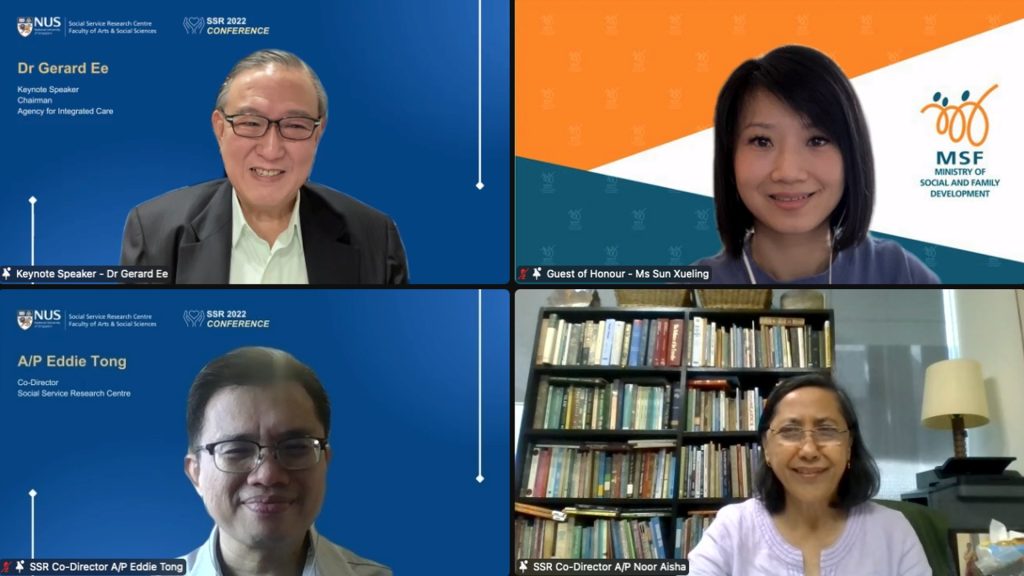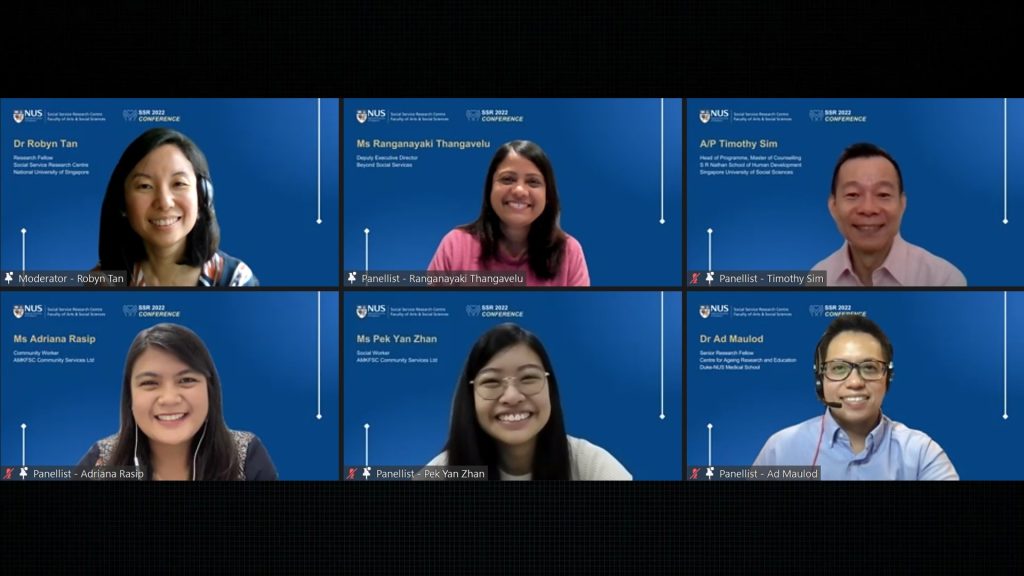Building Stronger Families and Communities in the Post-pandemic World
March 24, 2022
IN BRIEF | 8 min read
- In commemoration of World Social Work Day, the SSR Conference 2022 spotlights the struggles and resilience of vulnerable groups and social service workers alike as we journey towards the endemic stage of COVID-19.

Families here have weathered severe strain during COVID-19, but with support from the social service sector, they can emerge stronger and closer than ever before in the post-pandemic era.
As Singapore moves towards a COVID-19 endemic state, a key focus should be on upholding families, especially disadvantaged ones, speakers stressed at the 2022 Social Service Research Centre (SSR) Conference held on World Social Work Day on 15 March.
About 20 researchers and experts from a wide range of multidisciplinary fields, from healthcare to social work practice, shared their insights at the event organised by SSR, which is part of NUS’ Faculty of Arts and Social Sciences (FASS).
It was a timely discussion, as 2022 is dedicated as The Year of Celebrating Singapore Families, Minister of State Ms Sun Xueling, the guest of honour at the online event, told the audience.
“As we transition towards living with COVID-19 in our midst, we must continue to evolve the social service sector to keep pace with various needs, such that we can make Singapore the best place for families,” said Ms Sun, who has two portfolios – Ministry of Social and Family Development (MSF) and the Ministry of Education.
COVID-19 magnified existing challenges
The pandemic has compounded challenges for many families, especially the lower-income ones and those facing financial difficulties, unemployment or poor health, Ms Sun observed. Many also struggle with childcare and facilitating their children’s home-based learning.
These issues are not new. Dr Gerard Ee, the keynote speaker at the event, noted that “even before the pandemic, issues such as the need for a stronger community spirit in looking out for each other, social interaction and digital safety existed”.
“COVID has accelerated, expanded and magnified such issues,” added Dr Ee, Group Chairman for all the Canossa programmes in Singapore, the Agency for Integrated Care and the Charity Council.
Challenges for social workers
Social workers, too, struggled during the pandemic.
“By the very nature of their jobs, social workers are already quite vulnerable to stress and burnout. COVID-19 increases this vulnerability,” pointed out SSR Co-Director and Associate Professor Eddie Tong from FASS’ Department of Psychology.
He cited a study in June 2020 that found that close to half of frontline social workers in Singapore reported mild to severe levels of depression and anxiety.

The pandemic also created an extremely challenging climate for conducting research, recalled Dr Ad Maulod, Senior Research Fellow at Duke-NUS Medical School’s Centre for Ageing Research and Education.
He recounted how researchers seeking to conduct five qualitative evaluation projects on older persons and their caregivers faced severe limitations during the pandemic that made in-person interviews difficult.
Digital illiteracy also made online interviews challenging for many elderly. The teams were rejected by some 75 per cent of the people they approached for interviews – an “unprecedented rate”, said Dr Maulod.
Adaptation and resilience
Despite the heightened challenges, however, many families and social workers have pulled through.
“Many Singaporeans have shown considerable resilience and optimism during the pandemic,” said Assoc Prof Tong.
To counter the isolating effects of the pandemic, community and service workers have sought to boost inclusion and empowerment of residents and beneficiaries within a community, said speakers on the first panel, which focused on “Community and Social Development in the post-pandemic era”.
At the new 643 Community Hub in Ang Mo Kio, for instance, Ms Adriana Rasip and Ms Pek Yan Zhan of AMK Family Service Centre shared stories and case studies about how residents co-created care programmes for neighbours who required support.
Dr Maulod also spoke of how intergenerational community support complements the family unit as a first line of defence in helping vulnerable older persons thrive in the “new norm”.
The other two panels examined the topics of “Mitigating the effects of COVID-19 on the wellbeing of the youth and elderly” and “Digital inclusion in COVID-19 times and beyond”. Professor Vineeta Sinha from the FASS Department of Sociology also contributed her thoughts during the second panel discussion.
The way forward
Dr Robyn Tan, an SSR Research Fellow who moderated the first panel discussion, suggested that the social work sector can review how they can further empower clients and beneficiaries, challenging themselves with the question: “We are helping, but are we helpful?”
For MSF, making “an important shift” in approach from agency – dispensing help based on the way government schemes are organised – to family, where support is designed to meet the specific needs of each family, was a step towards being helpful, Ms Sun said.
For the broader social service sector, Dr Ee called for more “system thinking” in social programmes to address the individual’s needs more holistically, while creating a national glossary and taxonomy in order to standardise the way data is communicated.
He also emphasised the importance of examining issues with greater granularity to reflect the diverse views and values in our multicultural community.
More than 230 social service professionals, researchers and scholars attended the virtual conference, which has provided plenty of food for thought, and ideas and insights to sustain Singaporean families and communities in the years ahead. Since its launch in April 2015, SSR has been engaging the social service sector in impactful social service research and spearheaded research capability development programmes for social service agencies.
This article first appeared on NUSNews on 23 March 2022.

